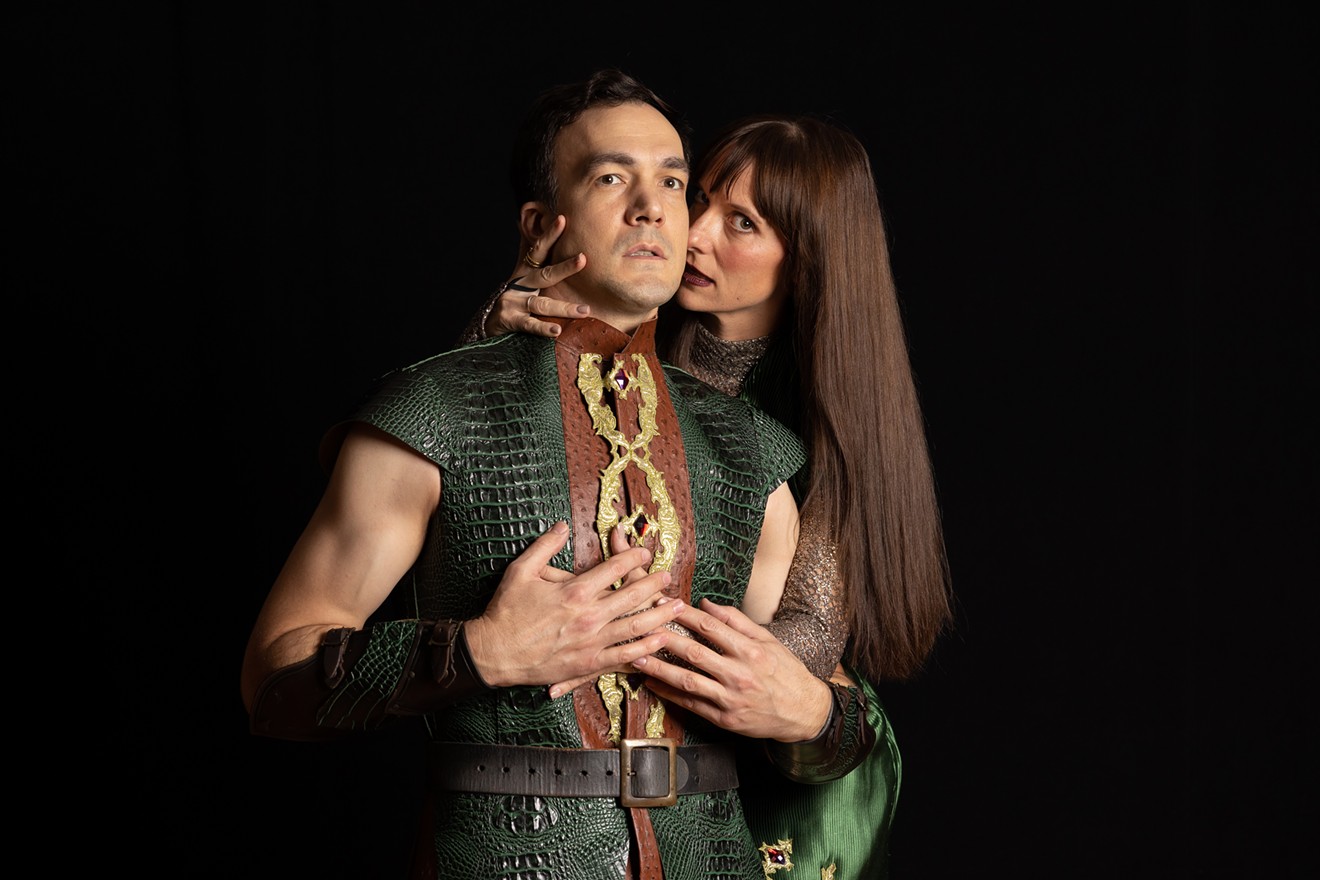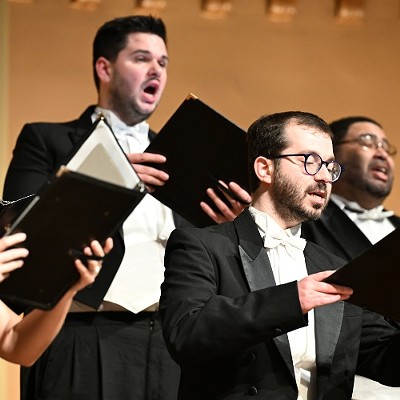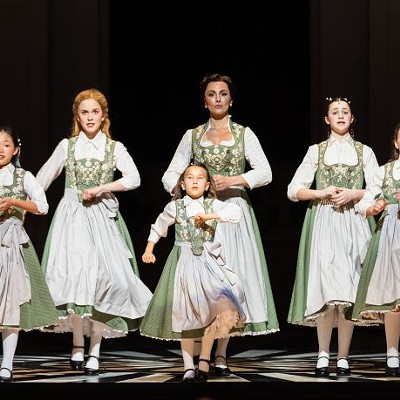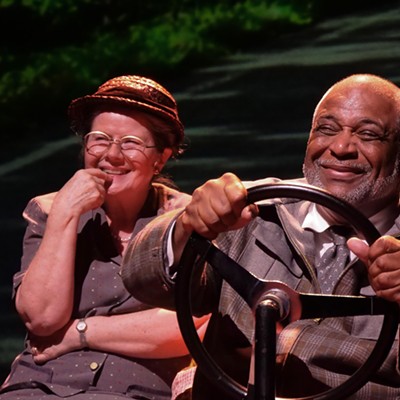Legend has it that William Shakespeare’s Macbeth is cursed. It’s a longstanding superstition that states that if someone involved in the production speaks the play’s name – Macbeth – in the theater, it will cause bad luck. Of course, there’s a way around it that involves spinning around a few times and spitting that should break the curse if necessary.
The good news is that Houston Shakespeare Festival’s production of Macbeth, now playing in repertory with Much Ado About Nothing, is far from cursed. Unless the consequence of the curse is just to be a little lackluster, in which case, it’s definitely cursed.
But let’s back up a little.
In Shakespeare’s classic tale, after a battle, Macbeth and his best buddy Banquo encounter three supernatural beings that offer up some predictions. Namely, that Macbeth shall become king, and that Banquo's descendants shall become kings. Convinced by his wife to take matters into his own hands, Macbeth murders the current king and takes the crown. But there’s still that pesky bit about Banquo's sons becoming kings that plagues Macbeth because, as one of the greatest philosophizing quartets of our time has reminded us, ambition bites the nails of success.
It's a tale of unfettered ambition and betrayal, murder and revenge, and with such heavy themes at play, you can at least rest assured that Director Demetria Thomas has a talented cast of actors at hand. Thomas has extracted some great moments of performance out of the actors, led by Alan Brincks and Laura Frye.
Brincks and Frye play the Macbeths, two people in love who are ambition-crazy but lack the constitution and mental fortitude necessary to be the sociopaths they try to become. Both are particularly adept at delivering Shakespeare’s dialogue, and Frye imbues Lady Macbeth with a steely-eyed intensity that gives way to the most satisfying of breakdowns.
Kyle Clark excels as a grief-stricken, revenge-seeking Macduff, while Jay Sullivan’s Banquo is infused with honor and conviction. (Though, on a related note, a little more should probably be done to differentiate Sullivan’s characters in terms of costuming, because when he returns in the second act as Menteith, I couldn’t help but jot down, “Why is Banquo back with a Scottish accent?”)
The Three Witches, each here referred to as “Curse” in the program, are embodied by Skye Bronfenbrenner, Olivia Knight and Dinah Ndu. When they first appear, be-cloaked, they seem almost rabid. When they ditch the cloaks, they are unrecognizable entities, animalistic in nature and movement. Though it’s unclear what exactly they are, they do make for several chilling appearances, one in which they seem to sprout further animalistic, and skeletal, features.
Austin Hanna also gets a special shout-out for his drunken antics as the Porter and his delivery of some timely (and crowd-pleasing) knock-knock jokes.
Now, let’s talk the “MacRib” – a giant rib cage that towers over and around the stage, framing the action. Scenic Designer Jon Young has certainly created a striking, if fairly literal, visual. It works as a representation of what lies within the heart of man (emphasized further by the pulsing, thumping rhythm of Jon Harvey’s sound design and the very red-tinged lighting designs of Clint Allen) and, as it further fills out and around the stage for the second act, it emphasizes the claustrophobic feel as the consequences of their deeds close in on the Macbeths. It even offers the staging some depth.
But this leads into the biggest problem with the production: Where are we and when are we?
The symbolism of the set doesn’t help answer the question, and neither do Leah Smith’s costumes, which are a bit hard to get a handle on. Aside from the strong design of Lady Macbeth, which appears to be a nod to John Singer Sargent’s portrait of Ellen Terry, and Macbeth’s textured garb, which gives the scaly feel of a serpent, the costumes veer a little too far into cosplay territory and, as they in turn evoke Roman, Byzantine and medieval influences, it’s difficult to get a sense of what exactly is being cosplayed. And, insult to injury, it doesn’t help that sitting atop the heads of many of the actors are some of the worst wigs that have graced a Houston stage this season.
Together, all these elements leave the production feeling ungrounded, untethered in time and space. Though the themes found within Macbeth still resonate, this feels like a missed opportunity to further tease out the play’s continued relevance, to situate it further within today’s society or, at the very least, do something more entertaining.
Of course, because blame can always be shared, I will say that my biggest mistake was reading our own preview of the festival, which noted that Thomas’s Macbeth was “inspired by science fiction and post-apocalyptic stories.” If so, it’s unclear how exactly (maybe the witches?) and that’s too bad. Macbeth is arguably Shakespeare’s darkest play, and a dystopia might have just doubled down on that even further.
Macbeth continues at 8:15 p.m. on July 29 and 31, and August 2 and 4 at Miller Outdoor Theatre, 6000 Hermann Park. For information, call 832-487-7123 or visit milleroutdoortheatre.com. Free.
The good news is that Houston Shakespeare Festival’s production of Macbeth, now playing in repertory with Much Ado About Nothing, is far from cursed. Unless the consequence of the curse is just to be a little lackluster, in which case, it’s definitely cursed.
But let’s back up a little.
In Shakespeare’s classic tale, after a battle, Macbeth and his best buddy Banquo encounter three supernatural beings that offer up some predictions. Namely, that Macbeth shall become king, and that Banquo's descendants shall become kings. Convinced by his wife to take matters into his own hands, Macbeth murders the current king and takes the crown. But there’s still that pesky bit about Banquo's sons becoming kings that plagues Macbeth because, as one of the greatest philosophizing quartets of our time has reminded us, ambition bites the nails of success.
It's a tale of unfettered ambition and betrayal, murder and revenge, and with such heavy themes at play, you can at least rest assured that Director Demetria Thomas has a talented cast of actors at hand. Thomas has extracted some great moments of performance out of the actors, led by Alan Brincks and Laura Frye.
Brincks and Frye play the Macbeths, two people in love who are ambition-crazy but lack the constitution and mental fortitude necessary to be the sociopaths they try to become. Both are particularly adept at delivering Shakespeare’s dialogue, and Frye imbues Lady Macbeth with a steely-eyed intensity that gives way to the most satisfying of breakdowns.
Kyle Clark excels as a grief-stricken, revenge-seeking Macduff, while Jay Sullivan’s Banquo is infused with honor and conviction. (Though, on a related note, a little more should probably be done to differentiate Sullivan’s characters in terms of costuming, because when he returns in the second act as Menteith, I couldn’t help but jot down, “Why is Banquo back with a Scottish accent?”)
The Three Witches, each here referred to as “Curse” in the program, are embodied by Skye Bronfenbrenner, Olivia Knight and Dinah Ndu. When they first appear, be-cloaked, they seem almost rabid. When they ditch the cloaks, they are unrecognizable entities, animalistic in nature and movement. Though it’s unclear what exactly they are, they do make for several chilling appearances, one in which they seem to sprout further animalistic, and skeletal, features.
Austin Hanna also gets a special shout-out for his drunken antics as the Porter and his delivery of some timely (and crowd-pleasing) knock-knock jokes.
Now, let’s talk the “MacRib” – a giant rib cage that towers over and around the stage, framing the action. Scenic Designer Jon Young has certainly created a striking, if fairly literal, visual. It works as a representation of what lies within the heart of man (emphasized further by the pulsing, thumping rhythm of Jon Harvey’s sound design and the very red-tinged lighting designs of Clint Allen) and, as it further fills out and around the stage for the second act, it emphasizes the claustrophobic feel as the consequences of their deeds close in on the Macbeths. It even offers the staging some depth.
But this leads into the biggest problem with the production: Where are we and when are we?
The symbolism of the set doesn’t help answer the question, and neither do Leah Smith’s costumes, which are a bit hard to get a handle on. Aside from the strong design of Lady Macbeth, which appears to be a nod to John Singer Sargent’s portrait of Ellen Terry, and Macbeth’s textured garb, which gives the scaly feel of a serpent, the costumes veer a little too far into cosplay territory and, as they in turn evoke Roman, Byzantine and medieval influences, it’s difficult to get a sense of what exactly is being cosplayed. And, insult to injury, it doesn’t help that sitting atop the heads of many of the actors are some of the worst wigs that have graced a Houston stage this season.
Together, all these elements leave the production feeling ungrounded, untethered in time and space. Though the themes found within Macbeth still resonate, this feels like a missed opportunity to further tease out the play’s continued relevance, to situate it further within today’s society or, at the very least, do something more entertaining.
Of course, because blame can always be shared, I will say that my biggest mistake was reading our own preview of the festival, which noted that Thomas’s Macbeth was “inspired by science fiction and post-apocalyptic stories.” If so, it’s unclear how exactly (maybe the witches?) and that’s too bad. Macbeth is arguably Shakespeare’s darkest play, and a dystopia might have just doubled down on that even further.
Macbeth continues at 8:15 p.m. on July 29 and 31, and August 2 and 4 at Miller Outdoor Theatre, 6000 Hermann Park. For information, call 832-487-7123 or visit milleroutdoortheatre.com. Free.







